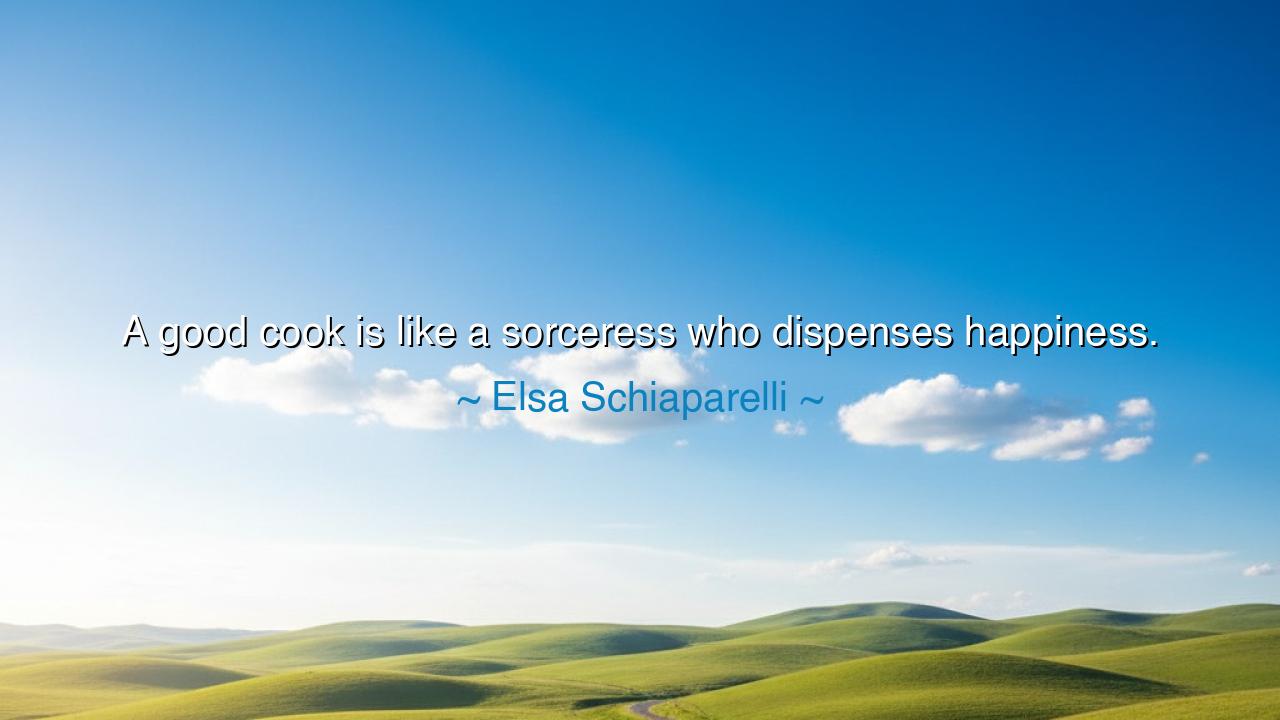
A good cook is like a sorceress who dispenses happiness.






When Elsa Schiaparelli said, “A good cook is like a sorceress who dispenses happiness,” she was not merely speaking of food, but of art, love, and the sacred alchemy of creation. Her words remind us that cooking, at its highest form, is not a mechanical act of sustenance but a kind of magic—a transformation of simple, earthly things into something that nourishes both body and soul. In every true cook, there dwells a quiet enchantress or enchanter, who weaves warmth, care, and joy into the fabric of everyday life. The kitchen becomes their temple, the spoon their wand, and the meal their blessing upon all who gather.
Schiaparelli, one of the great visionaries of twentieth-century fashion, was a woman who understood the power of creation. Her world was one of colors, dreams, and bold imagination. Yet in this quote, she turned her gaze from the runway to the hearth, recognizing that the same spirit that creates beauty in cloth can also create joy in bread. To her, the cook and the artist are kindred souls—both transform the ordinary into the extraordinary. Both take raw materials—fabric, flour, flavor, or light—and give them new life through passion and intent. A good cook, she says, wields this power not for vanity, but for the sake of others. Her art is an act of giving; her sorcery is the creation of happiness.
From the beginning of civilization, food has been more than nourishment—it has been communion. Around fire and table, humanity first learned to share, to love, to tell stories, and to heal wounds. The ancient Greeks honored Hestia, goddess of the hearth, as the protector of family and peace; the Chinese spoke of Chi, the life energy present in all food; and in every culture, the act of preparing a meal has been sacred. The sorceress Schiaparelli describes is, therefore, not a figure of fantasy, but a keeper of ancient wisdom—the one who turns chaos into comfort, hunger into delight, loneliness into togetherness.
Consider the life of Julia Child, who brought French cooking to millions of homes in America. Through her, generations learned that food could be a celebration of life, not a burden of labor. Her laughter, her clumsy grace, her fearless joy in creation—all of it was part of her spell. She once said, “People who love to eat are always the best people,” and she was right, for love of food is love of life itself. Julia’s kitchen was her stage and her sanctuary; her sorcery lay not only in butter and wine, but in her ability to awaken confidence and joy in others. She dispensed happiness not only through the meals she made, but through the courage she inspired in others to create their own.
Schiaparelli’s words also whisper a deeper truth about human connection. In a world often hungry for kindness, a shared meal becomes an act of quiet salvation. The good cook listens without words; she understands that to feed someone is to care for their very being. Every dish she makes carries a message: You are seen. You are loved. You belong. And in that moment, she is no less than a sorceress—turning raw ingredients into memory, loneliness into warmth, and the simplest supper into a sacred feast.
The happiness she gives is not fleeting, because it feeds more than the stomach—it nourishes the soul. It is the kind of happiness that lingers, that returns in the memory of a taste or a smell years later. The aroma of bread baking, the spice of soup on a cold evening, the sweetness of fruit shared between friends—these are the small, unspoken miracles that hold the world together. Such moments remind us that joy does not always roar; sometimes it simmers quietly on the stove, waiting to be served with grace and gratitude.
So, my children of hearth and heart, learn from Elsa Schiaparelli’s wisdom: treat your daily acts of creation—whether in the kitchen, the workshop, or the soul—with reverence. Be a sorceress or sorcerer in your own life. Pour love into the simple, and let it become extraordinary. Feed others not only with food, but with attention, warmth, and laughter. Remember that happiness, like flavor, multiplies when shared. The good cook, like the wise poet or the brave leader, leaves a legacy not of power or wealth, but of contentment in the hearts she has nourished.
For in the end, the kitchen is a place where the divine meets the ordinary. And those who cook with love, as Schiaparelli said, become more than creators—they become dispensers of happiness, weaving the golden thread that binds families, friends, and generations. So light the fire, stir the pot, and remember: to feed another is to bless them—and in that blessing lies the truest magic of all.






AAdministratorAdministrator
Welcome, honored guests. Please leave a comment, we will respond soon